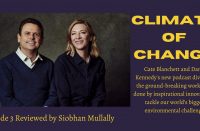In Hardin’s example, many ranchers live next to a communal pasture. Each time a rancher adds an animal to the pasture, the benefits accrue entirely to that rancher, while the costs (eaten grass, deposited waste) are divided among all the ranchers. With these incentives, too many animals end up exhausting the pasture, leading to collective ruin. Hence, the “tragedy” of the commons.
The idea has been challenged, most notably by Nobel Prize-winning political economist Elinor Ostrom. She has shown that many communities are able to develop effective local arrangements to manage common-pool resources, based on trust, cooperation and reciprocity.
Hardin believed the only solution to his tragedy was to turn common-pool resources into private property or put them under government control. Ostrom counters that leaving common-pool resources under community management can lead to effective long-term use (although not always).
While climate change is certainly a common-pool resource problem, it has so far proven intractable under both theories. In Hardin’s framework, the planetary atmosphere cannot easily be divided into private property, and there is no world government that could seize and administer it. Additionally, the forces of trust and cooperation that make Ostrom’s model work are much weaker at the international level than in a local community.
But maybe there’s another way to turn tragedy, if not into comedy, at least into a future that doesn’t involve exhausting our shared climate commons.
In 1986, The University of Chicago Law Review published a paper by Carol Rose, which observed, counter-intuitively, that some resources actually benefit from increasing use. Her example was a community dance, where each dancer adds opportunities for movement and reinforces the excitement. She referred to this effect as a “comedy of the commons.” (Although the term “comedy” had been used in this context previously by Ostrom and her colleagues, for Rose it was a central premise and from her work it passed into popular use.) The Internet is a 21st century example: the more people who use it, the greater the benefit to all.
Perhaps this perspective offers a better approach to international climate action than the current one. Gwyn Prins and an international group of climate, economics and social innovation experts opened the door to this idea in a 2009 paper that declared existing carbon controls a “failure.” They suggested the world go after carbon emissions “obliquely” instead, pursuing energy equity for developing nations, which necessarily requires decentralized, low-carbon technologies but is more politically tractable.
Suppose a group of countries each agreed to put some amount of funding into researching efficient technologies with the potential to decarbonize energy and reduce greenhouse emissions – and only share their discoveries with other members of the group. Such a deal would give each member a financial incentive to contribute to the common good, rather than take from it. Moreover, the more countries that joined, the greater the likelihood of valuable technologies being developed for all.
Of course, such a comedy of the commons solution would entail its own complications. For fairness, each country’s contribution should depend on its GDP, and research priorities should ensure that all participants stand to benefit. Partnerships with the private sector (particularly in developed countries) would be necessary, since they are often the leaders of innovation. Issues of patent and intellectual property rights would also need to be resolved, among other challenges.
Right now, climate change is shaping up to be the ultimate example of Hardin’s tragedy. But with some common thinking, Rose’s “comedy” might still get the last laugh.
Berkes & Plamer say collective community action will close the curtain on the Tragedy of the Commons. Visit ajmag.ca/commons
Garrett Richards is an interdisciplinary PhD student in environmental studies and political science at the University of Victoria. His primary research explores the ways that scientists and policy makers talk to one another about climate change.












